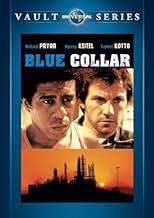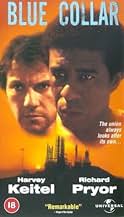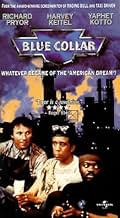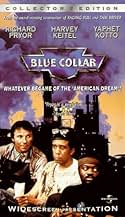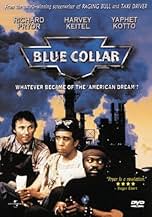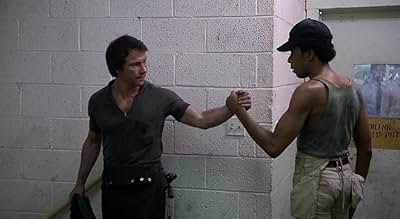When three automotive factory workers who're struggling financially try to steal from their own labor union, they discover corruption, and reluctantly decide to use this information for blac... Read allWhen three automotive factory workers who're struggling financially try to steal from their own labor union, they discover corruption, and reluctantly decide to use this information for blackmail.When three automotive factory workers who're struggling financially try to steal from their own labor union, they discover corruption, and reluctantly decide to use this information for blackmail.
- Awards
- 1 win & 2 nominations total
- Director
- Writers
- All cast & crew
- Production, box office & more at IMDbPro
Storyline
Did you know
- TriviaIt was a very tense shoot, because Richard Pryor, Yaphet Kotto, and Harvey Keitel argued constantly. There were fights, verbal abuse, walk-offs, and Mexican stand-offs. According to Paul Schrader, Pryor punched Keitel and hit Kotto with a chair during filming.
- GoofsWhenever the actors use air powered tools, the tools just spin in mid-air.
- Quotes
[last lines]
Smokey James: [voiceover echoing earlier line] They pit the lifers against the new boy and the young against the old. The black against the white. Everything they do is to keep us in our place.
- ConnectionsFeatured in At the Movies: Special Show: At the Cassette Store, Part 3 (1986)
- SoundtracksHard Workin Man
Music by Jack Nitzsche
Lyrics by Jack Nitzsche, Ry Cooder and Paul Schrader
Performed by Don Van Vliet (as Captain Beefheart)
The optimistic soul is Zeke Brown (Richard Pryor), who works alongside his two best friends Jerry Bartowski (Harvey Keitel) and Smokey James (Yaphet Kotto). A great deal of Zeke's motivation to run for union boss comes when a tax collector comes to his house to collect unpaid taxes. In a bout of rage and frustration I'm sure many of us have felt, Zeke rants at the blameless tax collector by saying he barely makes enough money to buy food for his home, let alone keep the electricity running. He follows up by asking why he can't get a break when the same tax collectors give countless breaks to those on Wall Street. Zeke's rant is one of the defining scenes of this film, for it tackles a problem that, even over thirty years following this film's release, is a constant, every-day problem and insurmountable battle for a great deal of families.
Zeke, Jerry, and Smokey decide to find a way to rob the union headquarters. However, upon executing their plan, they discover the union boss doesn't lie when he says that the union is low on cash, for they find very little money. The trio then stumble upon a ledger that contains information about illegal loans that reveal mob connections. Now the men know what it's like to be plunged into a world of crime and uncertainty, with their lives at risk and their optimism for their careers turned into a bitter, backstabbing game of survival of the fittest in a capitalist nightmare.
There's a sadness that lurks in many American crime dramas and that sadness usually stems from the fact that something that should benefit people, or, at the very least, give them something to believe in, doesn't actually operate the way people think it does. Martin Scorsese's Casino showed us the brutal interworkings of a Las Vegas casino that was rigged to make the consumer lose at all cost, and make the soul pay a hefty price had they tried to beat the odds, and a movie like Oldboy shows the real ugliness of people in a crowded, tight-knit area that would lead you to believe people would be brought together or at least unified on a collective term. Blue Collar, however, cuts deeper. These are blue collar jobs we're looking at with this film; not clean-cut white collar jobs and not a rare case of fraud or backhanded dealings in one company. These kinds of manipulating tactics used amongst big business are an unfortunately common practice and Schrader exposes it in a startling manner.
Schrader uses his exposure by getting Richard Pryor the leading role in a film that only manages to be funny when Pryor's character shows off his brazen attitude, which is very infrequent. Here, Pryor goes from the easily recognizable funny-man many of us know him as to a frighteningly hungry character, be it hungry for truth, or eventually, hungry for manipulation and winning. He commands the screen, even when assisted by the likes of Kotto and Keitel. This is his film through and through, a film where his formerly basic color palette of an actors transcends any kind of pre-conceived notions or judgment and shine bright and really show audiences his capabilities as a well-rounded character actor.
Blue Collar is an ugly film, thematically and in terms of the situations its characters are forced into. It shows personal economic freedom and progress as a neverending cycle that results in nothing but further inequality and disenfranchisement from a country that allegedly fights against it. If a film like this came out in present time it would be a strong social statement, but its 1978 release date shows that little has changed in present time when it comes to the dealings of big business.
Starring: Richard Pryor, Harvey Keitel, and Yaphet Kotto. Directed by: Paul Schrader.
- StevePulaski
- Jul 8, 2015
- Permalink
- How long is Blue Collar?Powered by Alexa
Details
- Release date
- Country of origin
- Language
- Also known as
- Blue Collar - Kampf am Fließband
- Filming locations
- Production company
- See more company credits at IMDbPro
Box office
- Budget
- $1,700,000 (estimated)
- Gross US & Canada
- $6,521,083
- Gross worldwide
- $6,521,083
Contribute to this page




